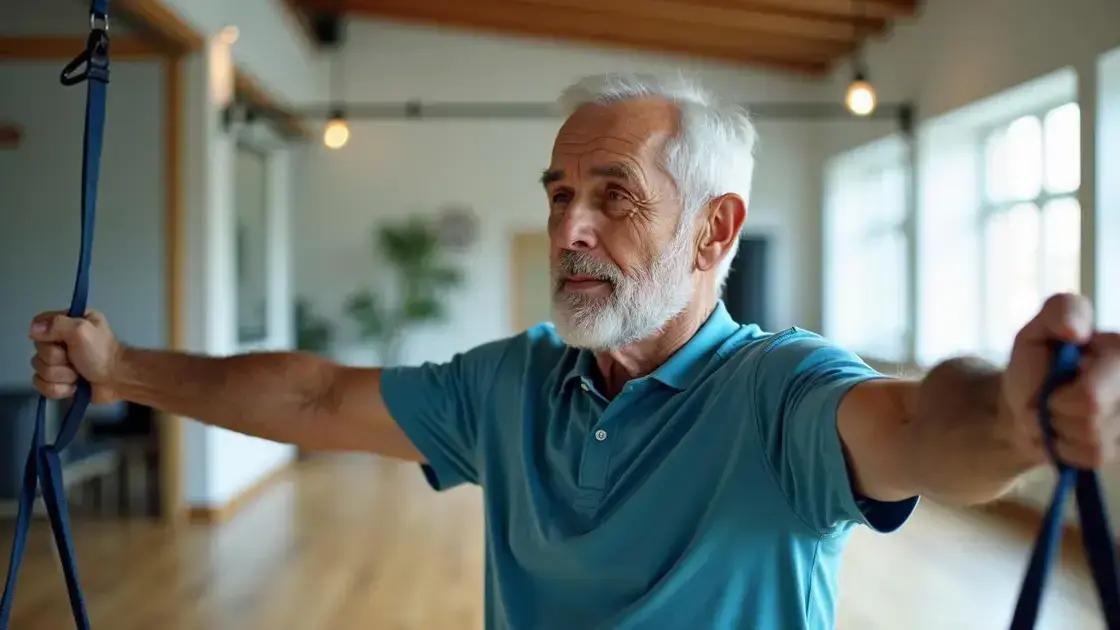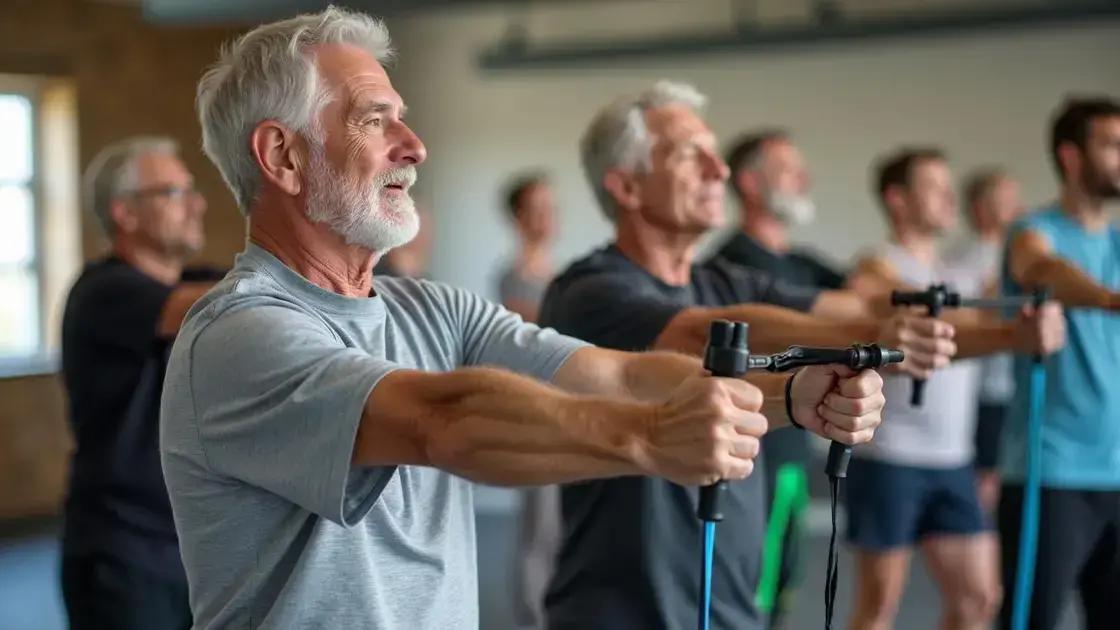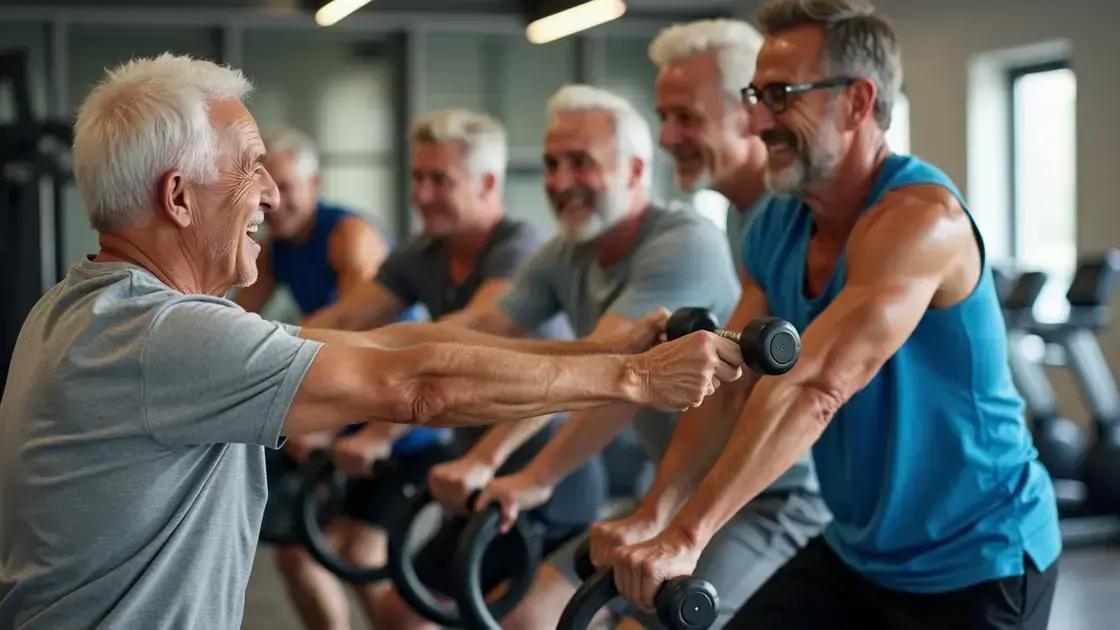Functional fitness for men over 50 offers numerous benefits, including improved strength, flexibility, balance, and overall health, enhancing daily activities and quality of life. By incorporating core movements and gradually increasing intensity, men can start a functional fitness program effectively.
As men age, maintaining physical health becomes increasingly important. Functional fitness offers numerous benefits for men over 50, promoting not just strength but also enhanced mobility and a better quality of life. In this article, we will delve into what functional fitness is, explore its key health benefits, provide tips for getting started, and share inspiring success stories that illustrate just how impactful this approach to fitness can be.
Understanding Functional Fitness

Functional fitness is a type of exercise that focuses on movements that people use in their daily lives. This type of training helps improve overall strength, balance, and flexibility, which are especially important for men over 50. As we age, our bodies naturally lose muscle mass and flexibility, making everyday tasks more challenging.
What is Functional Fitness?
Functional fitness activities involve movements that mimic real-life actions. This includes exercises that use multiple muscle groups such as squatting, lunging, pushing, and pulling. Examples of these exercises are deadlifts, kettlebell swings, and planks. Using our body weight or functional fitness equipment helps us build strength in a more practical way.
Why is Functional Fitness Important for Men Over 50?
As men age, staying active and strong is crucial for maintaining independence. Functional fitness prepares your body to perform daily activities with ease, such as lifting groceries or climbing stairs. This type of training can also help prevent falls, a common concern as we get older.
Key Aspects of Functional Fitness
When incorporating functional fitness into your routine, consider these aspects:
- Core Strength: A strong core is essential for stability and balance.
- Flexibility: Stretching helps maintain mobility and reduces the risk of injury.
- Balance Training: Improving balance techniques can prevent falls.
By focusing on these areas, men over 50 can benefit from improved strength and endurance. Functional fitness not only keeps you active but also contributes to your overall health and well-being.
Key Health Benefits for Men Over 50

Functional fitness offers several key health benefits for men over 50. Engaging in regular functional exercises can greatly improve physical performance and enhance well-being.
Improved Muscle Strength
One of the main advantages is increased muscle strength. Strength training helps counteract the natural decline in muscle mass that occurs with age. Building muscle strength allows men to perform daily activities more easily, like lifting objects or getting up from a chair.
Enhanced Flexibility and Mobility
Participating in functional fitness activities promotes better flexibility and mobility. This is essential for maintaining a healthy range of motion in the joints, which can decrease the risk of injuries and improve overall movement.
Better Balance and Coordination
Another crucial benefit is improved balance and coordination. Many functional fitness exercises focus on stabilizing muscles that support balance. Improved balance helps prevent falls, a common concern for older adults.
Cardiovascular Health
Functional fitness can also support cardiovascular health. Many routines incorporate aerobic activities, like circuit training or high-intensity workouts, which improve heart health and stamina. This leads to better overall health and energy levels.
Mental Well-Being
Additionally, regular exercise has positive effects on mental health. Engaging in functional fitness can reduce stress and anxiety, improve mood, and boost confidence. A strong body contributes to a strong mind.
Social Connections
Finally, participating in fitness groups or classes offers opportunities for social connections, which are essential for mental health and overall happiness. Building relationships with others who share similar fitness goals can provide motivation and support.
Tips for Starting Functional Fitness

Starting functional fitness can be simple and rewarding. Here are some helpful tips to get you going on your fitness journey. These steps focus on ensuring safety and effectiveness.
Set Clear Goals
Begin by setting clear and achievable goals. Determine what you want to accomplish, whether it’s losing weight, gaining strength, or enhancing flexibility. Having specific goals can keep you motivated and focused.
Start Slow and Progress Gradually
It’s important to start slow and gradually increase the intensity of your workouts. Listen to your body to avoid injuries. Begin with basic movements and exercises before advancing to more challenging routines.
Focus on Core Movements
Incorporate core movements into your routines. Key exercises to include are squats, lunges, push-ups, and planks. These exercises not only strengthen major muscle groups but also improve stability and balance.
Consider a Professional Trainer
Working with a professional trainer, especially at the beginning, can be beneficial. A trainer can help you learn proper techniques, create a personalized program, and ensure you are performing exercises safely.
Incorporate Flexibility and Balance Training
Make sure to include flexibility and balance training in your routines. Stretching before and after workouts can enhance flexibility, while balance exercises can help prevent falls.
Stay Consistent
Consistency is key to success in functional fitness. Aim to exercise at least three to four times a week. Keeping a workout schedule can build a habit and make you more likely to stick with your routine.
Listen to Your Body
Always listen to your body. If you feel pain or extreme discomfort, it’s important to stop and rest. Pushing through pain can lead to injuries and setbacks.
Success Stories and Testimonials

Success stories and testimonials from men over 50 who have embraced functional fitness show how impactful this approach can be. Here are a few inspiring examples:
John’s Transformation
At 55, John struggled with daily tasks and had low energy. After starting a functional fitness program, he lost 20 pounds and improved his strength. “I can now play with my grandkids and carry groceries without feeling tired!” John shares.
Mike’s Journey to Better Health
Mike, age 60, found himself becoming less active and gaining weight. He joined a local gym that offered classes focused on functional fitness. “The workouts are fun and challenging. I feel more energetic and healthy than I have in years,” says Mike.
David’s Improved Balance
At 62, David was worried about falling due to his balance issues. Through consistent functional fitness training, he enhanced his stability and confidence. “Now, I walk confidently and even go hiking with friends!” David expresses his excitement.
Testimonials from Classmates
A group of friends in their 50s and 60s started working out together. They say, “Functional fitness has changed our lives. We not only get stronger but also enjoy each other’s company. It keeps us motivated!” Their camaraderie has helped them stick to their goals.
Community Support
Local gyms and trainers often share stories of clients, emphasizing that functional fitness brings people together. “We love celebrating each other’s achievements. The support helps everyone stay focused on their journey to better health,” a trainer recalls.
In summary: Embrace Functional Fitness for a Better Life
Functional fitness presents a multitude of benefits for men over 50, enhancing strength, flexibility, balance, and overall health. By engaging in exercises that mimic daily activities, you can enjoy improved mobility and confidence in everyday tasks.
Starting your functional fitness journey is simple. Set clear goals, start with manageable routines, and consider seeking guidance from professionals. Gather inspiration from the success stories of others who have transformed their lives through this approach.
Community support, motivation, and dedication are crucial in maintaining a healthy lifestyle. The journey may present challenges, but the rewards are significant—better health, increased energy, and a more active life await you.
Embrace the change and take the first step toward a healthier, more vibrant future with functional fitness.
FAQ – Frequently Asked Questions about Functional Fitness for Men Over 50
What is functional fitness?
Functional fitness focuses on exercises that mimic everyday movements, improving strength, flexibility, and balance to enhance daily life activities.
What are the benefits of functional fitness for men over 50?
The benefits include improved muscle strength, enhanced flexibility, better balance, improved cardiovascular health, and boosted mental well-being.
How can I start a functional fitness program?
Start by setting clear and achievable goals, gradually increasing the intensity of your workouts, and incorporating core movements. Consider working with a professional trainer.
How often should I engage in functional fitness exercises?
Aim to exercise at least three to four times a week for best results. Consistency is key to seeing improvements in strength and mobility.
Are there specific exercises for improving balance?
Yes, exercises such as single-leg stands, lunges, and stability exercises can help enhance balance and prevent falls.
Can functional fitness help prevent injuries?
Yes, by improving strength, balance, and flexibility, functional fitness helps reduce the risk of injuries during daily activities.













